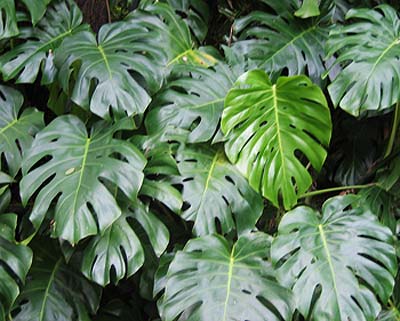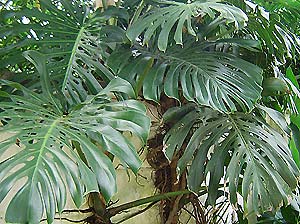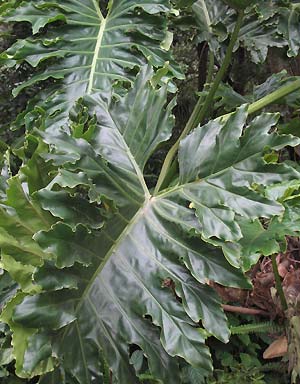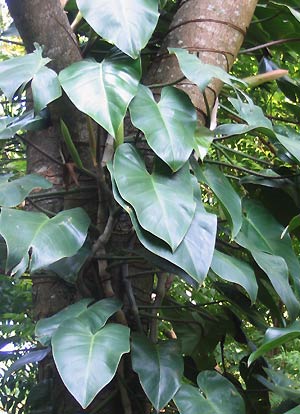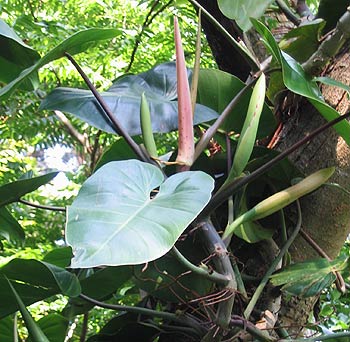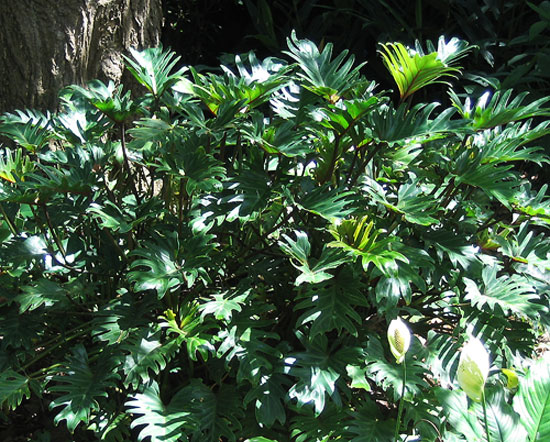With
philodendrons I have little ability to truly separate one from
another. I have put the most likely information I have with the
photograph
that seemed right, but don't take this as gospel. If you can
send me any helpful information I will be very appreciative.
|
Blushing
Philodendron, Red Leaf Philodendron Philodendron
erubescens
This is another of the tree hugging climbing
plants that make a tropical garden so vibrant. I think
philodendrons got a bad name as boring plants that
would survive anything in city offices. That reputation
is very undeserved when you see these beauties in action
in their own environments.
From: South America
Planting and Care: Like most members of
this extraordinary family, plant the blusher in a bright
shady area next to a tree that will be its partner in life.
Keep the soil continuously moist, but not wet.
Text
and Photograph Copyrighted ©KO 2010 and GreenGardeningCookingCuring.com
2014
|
Photographed: At
the Hotel San Buenaventura on Lake Atitlan in Guatemala.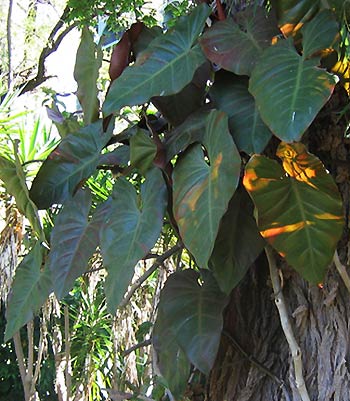
|
|
| |
Photographed: In
the Botanical Garden at the Hotel Atitlan on Lake Atitlan
in Guatemala in July of 2010.
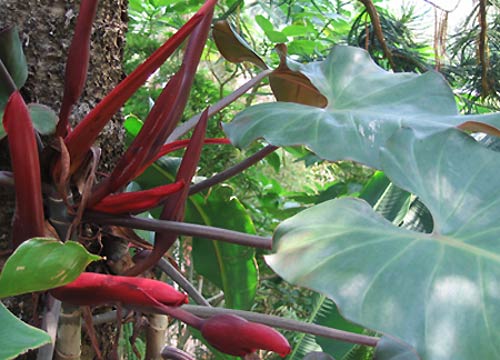
|
Photographed: In
the Botanical Garden at the Hotel Atitlan on Lake Atitlan
in Guatemala in July of 2010.
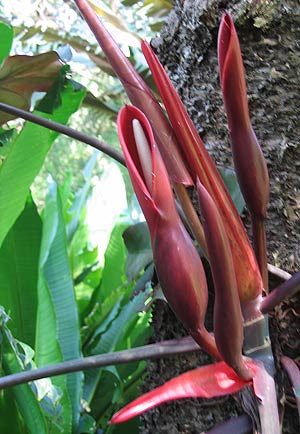
|
|
| |
Cut
Leaf Philodendron (1), Fruit Salad Plant Philodendron
radiatum or Monstera deliciosa or Philodendron
pertusum
In most northern climates, philodendrons are used as "just
can't kill it" plants in offices often where there is
no light, in apartment building entryways where it is relatively
dark and no one waters them. I always felt bad for these
plants as I passed by, and never wanted one of my own. Now
that we live and usually also travel in warm all year climates,
these plants have taken on a whole new character. They are
lush and grow virulently with very little care and many of
the philodendrons are spectacular like the one pictured on
the left.
I
have a great deal of difficulty distinguishing one from another and
so always look for something special in a particular plant. This one
has little holes only near
the rib line of the leaf.
Photographed: In August 2009, at the Rancho Grande
Inn in Panajachel, Guatemala. They have beautiful grounds and if you are curious
about the hotel here is a link to their web site: ranchograndeinn.com
Text and Photograph Copyrighted ©KO 2009/2010 |
|
| |
|
|
Cut-leaf
Philodendron (2), Tree Philodendron, Self-header Philodendron,
Split leaf Philodendron Philodendron selloum
syn. P. bipinnatifidum
This is a spectacular philodendron with deep green virulently
growing huge crinkled leaves -- about 18 to 24 inches stem to
stern. I had one when living in Rhode Island that occupied a
devoted 20 square feet of my very sunny living room. It was extremely
happy, but with all the other plants I sometimes felt a little
crowded.
Benefits: These are considered among the
best plants for clearing indoor spaces of formaldahyde.
From: South America
Photographed: At the Hotel San Buenaventura
on Lake Atitlan in Guatemala where we spent several months
in 2010.
Planting and Care: Decent soil in a brightly
lit but not sunny garden area and routine watering will keep
this wonder growing well -- maybe too well! It is not winter
hardy,
but if
you have
a large home and garden with a warm winter, it will please you
no end to have one of these beauties.
Warning: This plant is poisonous as are most
members of the philodendron family. They contain calcium
oxalate crystals which are
toxic when eaten fresh.
Text
and Photograph ©KO 2010 and ©GreenGardeningCookingCuring.com
2018 |
|
| |
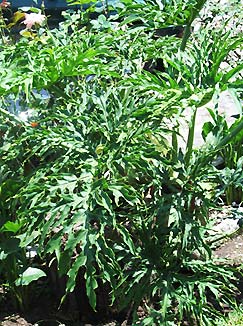
|
Hope
Philodendron
This is an unlikely member of the family growing in full sun. The sad little
philodendrons growing in northern climate offices probably around the world can
be entirely forgotten when you get a glimpse of the wonderful leaf shapes and
sizes
and the
settings where these philodendrons do well. I take back everything I've said
about philodendrons over the years.
Photograph: I photographed this plant at a hotel on the shore
of Lake Atitlan in Guatemala in May of 2010.
Text and Photograph ©GreenGardeningCookingCuring.com
2013 |
|
|
**Lacy
Tree Philodendron, Tree Philodendron, Saddle Leaf Philodendron Philodendron
bipinnatifidum
We found this appealing little philodendron growing plentifully in scrub woods
near a neighbor's home and took a small piece of it for our terrace garden.
From: South America
Photographed: In our terrace garden growing up a huge ficus
tree at our former home in Montserrat.
Planting and Growth: Semi shade to shady is best and with
routine rainfall it will do fine. As with pothos, this philodendron
seems to stay relatively small until it finds something to grow on finding its
way
off the ground and up into the trees. Then it truly takes off. The leaves and
stems become several times as large and the overall plant seems to grow much
more quickly, rapidly enveloping its host.
Text
and Photograph Copyrighted ©KO 2008 |
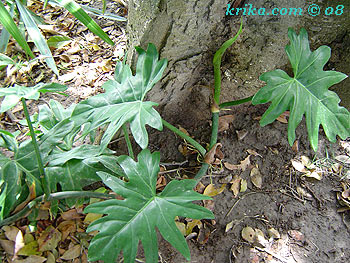 |
|
|
Philodendron
mandaianum
This is another of the large leaf philodendrons that grow best in warm,
moist and shady conditions.
Benefits:
From:
Photographed: In the Botanical Garden at the Hotel Atitlan
on Lake Atitlan in Guatemala in July of 2010.
Planting and Care: As you can see in the photographs
below this plant like most philodendrons like a shady, moist
place in the garden. Ideally it should be planted by a tall
tree which it can use as a support for climbing.
Text and Photograph Copyrighted ©GreenGardeningCookingCuring.com
2018
My
#11 and 14 Vine Mysteries were solved by Glenn a visitor to
my website who lives in Brisbane, Australia. Many thanks for
your help.
|
|
| |
My
#2 Philodendron Mystery was solved by Ella, a visitor to my
site. Many thanks for your help.
|
| |
Winterborn
Philodendron Philodendron 'Xanadu'
This philodendron seems a reduced size plant in its larger family growing only
to a height of under 3 feet and a width maybe a little wider. It is very appealing
nonetheless.
Benefits:
From: Brazil
Photographed: In
the Royal Botanic Garden in Sydney Australia in 2013.
Planting and Care: Like most in the philodendron
family, the xanadu is not really winter hardy. It likes to
grow in early morning sun and bright light for the rest of
the day with routine rainfall or watering.
Text and Photograph Copyrighted ©GreenGardeningCookingCuring.com
2015
With
my appreciation, my #37 plant mystery was identified by
Peter from Auckland, New Zealand. |
|
|
